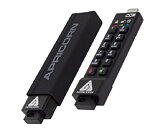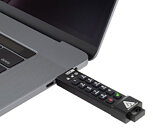Thursday, July 23rd 2020
Apricorn Releases the First Hardware-Encrypted USB Type-C Flash Drive
Apricorn, the leading manufacturer of software-free, 256-bit AES XTS hardware-encrypted USB 3.2 storage devices, has launched the Aegis Secure Key 3NXC - the first device of its kind with a USB-C connector. This makes it the only hardware-encrypted flashkey that is compatible with the next generation of laptops, smartphones, tablets and hubs, without the need for a separate A-to-C adapter.
Designed with the USB 3.2 ports of the next generation of computers, tablets, smartphones and hubs, the Secure Key 3NXC is Apricorn's--and the market's--first hardware-encrypted flash key to be compatible with USB 3.2 C-ports without the aid of a separate A-to C adapter. Like its predecessor, the Secure Key 3NX, the Secure Key 3NXC line is priced to economically and efficiently protect the data of the expanding global remote workforce while delivering all of the advanced security features found in the Aegis family of secure drives. By offering a range of 6 storage capacities from 4 GB to 128 GB, the Secure Key 3NXC allows the IT admin to closely align the device capacity with the storage needs of each individual employee, reducing overall cost of deployment. Prices range from $59 to $179.Kurt Markley, Apricorn's Director of Sales, says, "Even before the COVID-19 pandemic, remote and mobile working was on the rise. As the global workforce shifted from office to home practically overnight, the demand for our encrypted secure keys skyrocketed, as did the demand for our A-to-C adapters. We accelerated the release of the Aegis Secure Key 3NXC to provide an efficient way of ensuring that employees using MacBooks, iPads and Android devices can securely store and move sensitive data, wherever they're working."
The Aegis Secure Key 3NXC completes the Secure Key 3NX family, which Apricorn updates constantly to address evolving security threats and business needs for highly regulated sectors such as defense, finance, government, manufacturing and healthcare. The 3NXC was created in response to a market that's moving towards smaller and thinner laptops and tablets that can't accommodate a USB-A port.
"While most computers and laptops still offer both A and C connector ports, the number of those who exclusively committing to type C continues to grow year over year," says Markley. "USB isn't just there for peripherals or charging phones anymore, but to power up these machines on that same port. We are developing with this next generation of computers in mind, and at the same time, continuing to manufacture type A devices for those who need them for the foreseeable future."
Standard features shared with the Aegis family include onboard keypad authentication, 256-bit AES XTS hardware encryption, complete cross-platform compatibility, read-only options, separate admin and user access, data recovery PINs, programmable PIN lengths, and Aegis Configurator compatibility.
The 3NX family offers one unique feature that is not available on any other hardware encrypted device: the ability to toggle between Fixed Disk and Removable Media (U.S. Pat. No 10,338,840). FIPS 140-2 Level 3 validation which is expected later this year.
The security advantages of Apricorn's hardware encrypted USB storage devices include:
Designed with the USB 3.2 ports of the next generation of computers, tablets, smartphones and hubs, the Secure Key 3NXC is Apricorn's--and the market's--first hardware-encrypted flash key to be compatible with USB 3.2 C-ports without the aid of a separate A-to C adapter. Like its predecessor, the Secure Key 3NX, the Secure Key 3NXC line is priced to economically and efficiently protect the data of the expanding global remote workforce while delivering all of the advanced security features found in the Aegis family of secure drives. By offering a range of 6 storage capacities from 4 GB to 128 GB, the Secure Key 3NXC allows the IT admin to closely align the device capacity with the storage needs of each individual employee, reducing overall cost of deployment. Prices range from $59 to $179.Kurt Markley, Apricorn's Director of Sales, says, "Even before the COVID-19 pandemic, remote and mobile working was on the rise. As the global workforce shifted from office to home practically overnight, the demand for our encrypted secure keys skyrocketed, as did the demand for our A-to-C adapters. We accelerated the release of the Aegis Secure Key 3NXC to provide an efficient way of ensuring that employees using MacBooks, iPads and Android devices can securely store and move sensitive data, wherever they're working."
The Aegis Secure Key 3NXC completes the Secure Key 3NX family, which Apricorn updates constantly to address evolving security threats and business needs for highly regulated sectors such as defense, finance, government, manufacturing and healthcare. The 3NXC was created in response to a market that's moving towards smaller and thinner laptops and tablets that can't accommodate a USB-A port.
"While most computers and laptops still offer both A and C connector ports, the number of those who exclusively committing to type C continues to grow year over year," says Markley. "USB isn't just there for peripherals or charging phones anymore, but to power up these machines on that same port. We are developing with this next generation of computers in mind, and at the same time, continuing to manufacture type A devices for those who need them for the foreseeable future."
Standard features shared with the Aegis family include onboard keypad authentication, 256-bit AES XTS hardware encryption, complete cross-platform compatibility, read-only options, separate admin and user access, data recovery PINs, programmable PIN lengths, and Aegis Configurator compatibility.
The 3NX family offers one unique feature that is not available on any other hardware encrypted device: the ability to toggle between Fixed Disk and Removable Media (U.S. Pat. No 10,338,840). FIPS 140-2 Level 3 validation which is expected later this year.
The security advantages of Apricorn's hardware encrypted USB storage devices include:
- No software involved -nothing to keylog or to hack
- OS Agnostic—completely cross platform compatible
- Onboard keypad—all authentication takes place within the device itself
- All data, passwords and encryption keys are 256-bit encrypted at rest
- No host computer involved in setup, authentication or encryption
- Forced Enrollment - no default PINs ensures that data is not put at risk by employees who fail to change the PIN before deployment
- IP-68 validated against water and dust damage.


3 Comments on Apricorn Releases the First Hardware-Encrypted USB Type-C Flash Drive
I can imagine constant pressing of keys would strain the USB-C connector greatly while inserted.